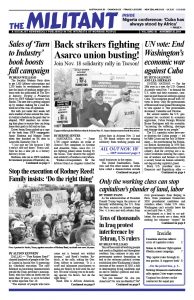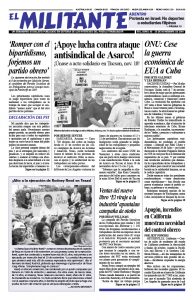UNITED NATIONS — For the 28th year in a row, the U.N. General Assembly voted Nov. 7 to demand the U.S. rulers end their economic, commercial and financial embargo against Cuba. The resolution passed with 187 votes in favor. Only the governments of Brazil and Israel joined Washington to vote against it. Two governments abstained, Colombia and Ukraine.
For several months the U.S. government has escalated its economic aggression, Cuban Foreign Minister Bruno Rodríguez told the assembly, “increasing the suffering, shortages and damage done to our people.”
The U.S. capitalist rulers have never forgiven the Cuban people — led by Fidel Castro and the July 26 Movement — for overthrowing the Fulgencio Batista dictatorship in 1959 ending the imperialist domination of their country. And for carrying out a socialist revolution showing the capacities of workers and farmers to build a society based on human solidarity, not dog-eat-dog capitalist greed.
Every U.S. president since — Democrat and Republican alike — has waged economic war against the Cuban people, their government and their revolution.
Rodríguez listed many of the recent U.S. attacks, including blocking Cuba from importing fuel by sanctioning and threatening maritime shipping and insurance companies; reinstating limits on remittances Cuban Americans send to their families on the island; banning Cuba from leasing airplanes or purchasing just about anything with more than 10% U.S. components; tightening the squeeze on banks that handle Cuban transactions; and ending cruise ship stops as well as direct flights to Cuban airports, except for Havana, measures aimed at sabotaging tourism and the income it brings to those on the island.
US proclaims ‘right’ to punish Cuba
Before Rodríguez spoke, U.S. Ambassador Kelly Craft denounced the resolution, saying the embargo was just Washington asserting its “sovereign right” to “choose which countries we trade with.”
She said nothing about the objection raised by almost every speaker during the two-day debate — that Washington dictates that all other governments and corporations around the world also punish Cuba or face U.S. retribution.
The U.S. ambassador slandered the Cuban government, claiming it “abuses” its own people and violates their human rights. She pushed Washington’s lie that Cuban doctors who volunteer for the country’s health care missions around the world, are “held in servitude.”
And she claimed that Cuba is allowed to purchase $100 million worth of agricultural products and medicines from the U.S. but refuses to do so.
Cuban Foreign Minister Rodríguez answered her, citing examples of medicines and medical devices that Washington refuses to allow Cuba to get.
He explained how Washington imposes restrictions on Cuba that no other nation faces to buy the few products exempted from the embargo. Cuba has to pay cash up front; is not allowed to buy on credit; Cuba is prohibited from using its own ships to transport goods it can purchase; and, he said, “banks that process our transactions are persecuted.”
“Who in the world trades under these conditions?” he said.
Pointing to U.S. military interventions around the world, as well as widespread police brutality, the racist application of the death penalty, and abusive treatment of immigrants in the U.S., Rodríguez said, “The U.S. government doesn’t have the tiniest bit of moral authority to criticize Cuba or anyone else over human rights.” He noted that fully one-quarter of all those incarcerated in the world are in U.S. prisons.
But not every representative who voted for the resolution did so out of solidarity with Cuba. Finnish representative Jukka Salovaara, speaking in the name of the European Union, said EU members were voting for an end to the embargo because “critical engagement” is necessary to undermine Cuba’s political and economic system.
The latest moves intensifying the U.S. embargo, he complained, were “very damaging for Cuba’s burgeoning private sector” and “EU economic interests.”
He called on Cuba “to pursue a comprehensive reform and modernization agenda,” code words for bringing back capitalism, and echoed the U.S. slanders that Cuba violates human rights.
Cuba’s example of solidarity
Rodríguez didn’t need to answer the U.S. slander on Cuba’s international solidarity missions, which include thousands of doctors and nurses in dozens of countries. One ambassador after another, regardless of their government’s opinions on Cuba’s revolution, spoke about their experience with Cuban internationalist volunteers.
“The majority of members of this organization have profited from Cuba’s invaluable assistance, solidarity and support,” stated Ingha Rhonda King, the representative of Saint Vincent and the Grenadines. “In the areas of health care and humanitarian assistance, Cuba’s contribution to underserved areas in the world is unparalleled and was typified with its role in the fight against the Ebola epidemic in Africa.”
Belize Ambassador Lois Young said the U.S. embargo is meant “to drive a wedge between Cuba and the rest of the world,” and this was “unacceptable.”
Representatives of several African governments noted the role of Cuba in helping them win independence from colonial rule and in the fight against South African apartheid. In the 1988 battle of Cuito Cuanavale, the combined forces of Cuban internationalists, Namibian freedom fighters and Angolan soldiers defeated an invasion by the white supremacist South African army.
By the early 1990s, Namibia gained its independence from South Africa, Nelson Mandela was freed and the hated apartheid regime crumbled.
Cuba has been “at the forefront of contributing to the freedom and independence of my country,” Nelville Gertze, Namibian U.N. ambassador, said.
Despite U.S. hostility and slanders, Cuban Ambassador Rodríguez said Cuba does not “renounce our willingness to achieve a civilized relationship” with Washington “based on mutual respect and recognition of our profound differences.”
The Cuban Revolution, its 60-year battle resisting the U.S. capitalist rulers’ aggression and economic war, and its internationalist solidarity with working people the world over stand as an example for workers and farmers to emulate, including in the U.S.

